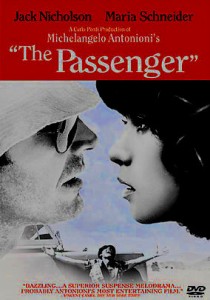The Passenger-1975
Director Michelangelo Antonioni
Starring Jack Nicholson, Maria Schneider
Scott’s Review #259
Reviewed July 19, 2015
Grade: A
A true art film in every sense of the word, The Passenger (1975) is a thinking man’s film, not for those content to munch on popcorn and escape the day’s stressors, but rather, custom-made for a film fan willing to ponder the meaning of the film, revel in the slow pace, and appreciate the film as an art form.
The Passenger is tough to “get” throughout most of its over two-hour running time, but its complexities are also its most beautiful characteristics. To say that the film will leave the viewer with questions is quite an understatement, but is pleasing to analyze and come up with conclusions of meaning.
Michelangelo Antonioni directed this film and is well-known for directing Blowup and Zabriskie Point, neither of which I have seen as of this writing.
Jack Nicholson stars as a journalist named David Locke, who is on location in Africa (specifically the Sahara desert in Chad). David’s assignment is to produce a documentary film. While there he mysteriously assumes the identity of a businessman named Robertson, who he finds dead in his hotel room.
This task is easy because David and Robertson look very much alike. As events unfold, it becomes clear that Robertson is involved in arms dealings and smuggling matters related to the ongoing civil unrest within the country.
Flashbacks reveal David’s former life, including his friendship with the businessman, and his relationship with his wife, Rachel, and these scenes are mixed in with the current action until they become more linear with each other.
The film is complex, to say the least. The initial scene when David spontaneously decides to switch identities is excellent. We wonder, what are David’s motivations and what is the appeal of him taking over another man’s life? Who is the man? Why is David so unhappy in his own life?
The film succeeds immeasurably as the plot is not simply told to the audience like so many other mainstream films. Events seem genuine and not forced for plot purposes.
In the current time, whereabouts in London, Rachel sadly mourns the assumed “death” of her husband David, though we learn that Rachel has secrets of her own she has been hiding and suffers from tremendous guilt.
To further complicate matters for everyone, she is attempting to find the businessman, since she has learned that he was the last person to see her husband alive. Also mixed into the story is a mysterious young woman whom David meets when the story moves to Barcelona, Spain.
What makes The Passenger so compelling to me is its intricacies- story as well as camera styles. The seven-minute-long shot towards the end is brilliant filmmaking and the climax is quietly intense.
The camera’s focus is on a hotel room, switches to the parking lot, and returns to the hotel room. I was transfixed by the character of David enormously, struggling to empathize with him, while all the while enjoying an intelligent character study mixed in with a story of political intrigue.
I do not confess to understanding everything about The Passenger and will surely need more viewings to make more sense of it all, but the film fascinates me.
In a time of mediocre films, how refreshing to stumble upon a forgotten relic from 1975 and have a renewed appreciation for film as an art form.
